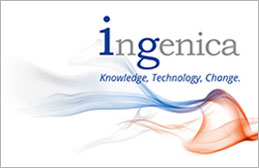April 08, 2016 Guest opinion piece
 In the following opinion piece, Nicola Hall, Managing Director at Ingenica Solutions, discusses the education programme needed to ensure a successful rollout of GS1 standards in the NHS. Ingenica are silver sponsors of the GS1 UK Healthcare Conference 2016.
In the following opinion piece, Nicola Hall, Managing Director at Ingenica Solutions, discusses the education programme needed to ensure a successful rollout of GS1 standards in the NHS. Ingenica are silver sponsors of the GS1 UK Healthcare Conference 2016.
At this year’s GS1 conference, following the announcement of the demonstrator sites, reports from the Trusts at the “coalface” as to the anticipated challenges and successes are eagerly awaited.
With a share each of £12m government funding, their task is to develop guidance and best practice for others to follow. Some Trusts are waiting to see the results, some are already well on their way to GS1 compliance, and some may be planning to settle for an outcome that puts a tick in the requirements box. The fact that some are taking a static position suggests that the importance of the choices that Trusts are making today has not yet been fully comprehended; this could cause a knock on effect to progress and may mean that GS1 adoption throughout the NHS deviates from the current timeframe.
Trusts should be making informed decisions on the solutions that will form the foundations of a seismic shift in the way they manage their business on a day-to-day operational basis, yet the “sticking plaster” approach still appears to dominate many Trusts.
The education programme for the GS1 requirements therefore has some way to go to close the divide, it’s not just the measures themselves but also considering the bigger picture and why GS1 standards are important to Trusts as the keystone to achieving Lord Carter’s requirements.
The education programme internally within Trusts needs to extend to all levels, from IT, clinical, procurement, supply chain and finance; although some may be unaware, everyone is part of it. I was recently faced with a director of IT who told me it was just a “bar-coding project”; this demonstrates the key messages are yet to reach everyone. GS1 is a data standards programme, and e-procurement is about trading electronically once we have data standards in place.
With a dispersed, shift-based workforce, it’s paramount to include everyone and equip individuals with the drive to adopt change and buy-in. Whilst many at the heart of procurement and supply chain management are clear on what’s involved, many are not engaged. Across the workforce, a lack of understanding and awareness exists in terms of how important individuals are to these changes. For GS1 standards to be a true success in all Trusts, every NHS employee must contribute; a message which must be fed across entire organisations, across the entire NHS.
The direct link between engaged staff, and better care and happier patients, has already been widely cited. Involving staff in the changes that GS1 standards bring, and maintaining communication every step of the way is vital; staff are more satisfied, efficiencies are improved, it leads to better clinical outcomes, and ultimately improves patient care. The Trusts that really thrive here are those where senior management make staff aware of how GS1 standards benefit their daily roles and responsibilities, and how it affects them. This enables staff to see a direct relationship between their role in the changes and its success.
Trusts have upwards of 100 systems between the electronic patient/patient administration system (front office), and the public sector commitment accounting based finance system at the back end of the process. In the NHS, the back office has multiple disparate systems that have no common data standard. I have called this crossing the back office void, the chasm that needs to be crossed in order to bridge the gap between good patient information and associated good financial information that provides real operational management information, at both the patient level and service line level. The solution is enterprise resource planning (ERP) in a service based healthcare environment.
With the focus firmly on the Trusts and their journey, we must also be mindful of progress in the supplier community, and their ability to adopt standards in the same time frame. Every supplier to the NHS needs to understand and consider the new requirements and bring their products and systems in line. Again an education programme must extend to everyone so let’s step up the pressure, let’s take an inclusive approach and get everyone involved.
A successful rollout can hinge on how engaged individuals are, not only in terms of keeping them up-to-date, but also helping them recognise the existing issues it addresses and opportunities it brings. It is clear that the Trusts that make informed decisions today will be significantly better placed in the future; an effective education programme can help close the gap.
 Article has been provided by Ingenica Solutions
Article has been provided by Ingenica Solutions
Ingenica Solutions has a proven track record in delivering focused IT solutions in the areas of procurement, supply chain and inventory management, bringing significant benefits to the NHS and the challenging healthcare environment.
Ingenica has been formed by a cohesive team that have all had clear and demonstrable success as thought leaders and practical project leaders in this area previously. The experienced Ingenica team have proven backgrounds in commerce, finance, procurement, supply chain management, information technology, software development and project management. All have had significant experience in both the Public and Private sector and have previously pioneered the delivery of Microsoft based solutions into the NHS.
The Ingenica Healthcare solution is developed within the Microsoft Dynamics platform. The solution enables a phased approach to implementation, configured to meet not only the current supply chain maturity of customers, but with a proven development and functionality road map. This ensures enhancements to capability continue well into the future and are scalable to meet future demand.
Ingenica is being extensively backed by professional Private Equity and as a Microsoft Partner is engaged closely with their Dynamics Product Group and Health Sector teams.
For further information contact Ingenica Solutions 0845 0660 100, visit www.ingenicasolutions.com or email info@ingenicasolutions.com
Follow us on Twitter @IngenicaS @NicolaHall68509